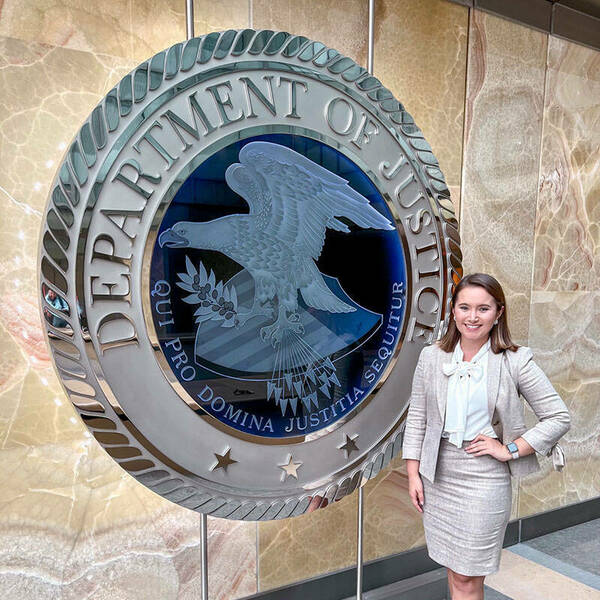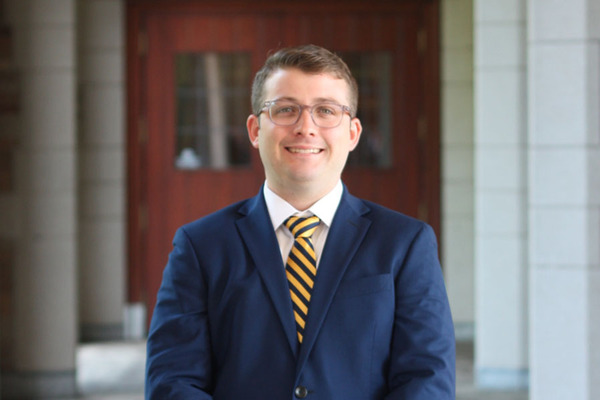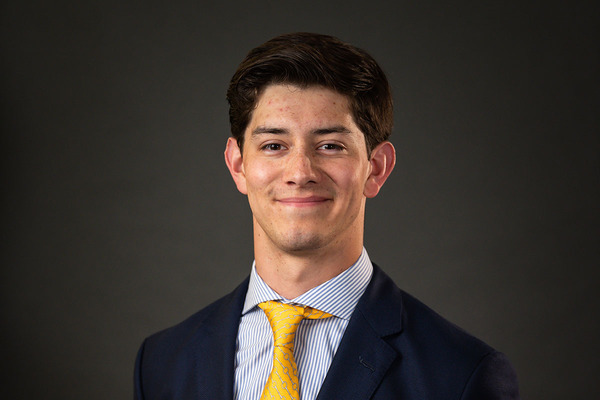Law School’s improved Loan Repayment Assistance Program a boost for 2023 graduates
Emma Hildebrand came to Notre Dame Law School with the goal of pursuing a career in government.
She took advantage of opportunities like the Notre Dame Law in D.C. program, where she spent the spring 2022 semester in an externship with the U.S. Agency for International Development. She also did a yearlong judicial externship with the U.S. District Court for the Northern District of Indiana, was executive articles editor for the Notre Dame Journal of Legislation and served as vice president of the Military and Veteran Law Society.

After Hildebrand graduates from Notre Dame Law School this weekend, she will realize her goal by returning to Washington to work for the U.S. Department of Justice as part of the prestigious DOJ Honors Program.
And, thanks to Notre Dame Law School’s Loan Repayment Assistance Program (LRAP), Hildebrand won’t have to worry about making payments on her students loans.
LRAP is one of the important ways that Notre Dame Law School fulfills its Catholic mission to educate a “different kind of lawyer” who uses his or her education for the public good. The program supports J.D. graduates who are beginning legal careers in the nonprofit sector, government, policy advocacy, human rights and other fields where lawyers make valuable contributions but are often paid lower salaries.
Earlier this spring, the Law School announced major enhancements to LRAP that will enable the program to support even more J.D. graduates who pursue their callings in public interest law and government. One of the significant changes is that LRAP will now cover graduates with salaries as high as $100,000, with upward adjustments for graduates with children. That is a 40 percent increase from the previous salary cap of $70,000.
In the class of 2023, LRAP will support new graduates who are starting jobs with nonprofit organizations, the federal government, prosecuting attorney offices, and federal, state and specialized courts.
“As a student who has been focused on public service throughout law school, thinking about the burden of student loan debt and the opportunity for higher incomes in other career paths can be discouraging,” said Hildebrand. “Notre Dame Law School has given us the opportunity to pursue a career in public service without having to worry about that burden.”
Under the previous LRAP structure, Hildebrand would not have qualified for the program because her DOJ salary is more than $70,000. She was excited to learn in March that Notre Dame Law School was improving LRAP to cover more J.D. graduates — including her.
“I would have been making just enough to disqualify myself from LRAP, but not enough to be able to balance the cost of living in Washington, D.C., with paying off my student loans,” Hildebrand said. “The improvements are immensely beneficial for many students in a similar situation.”

Mike Cassidy, another member of Notre Dame Law School’s class of 2023, will begin his career as a prosecuting attorney with the Tarrant County Criminal District Attorney’s Office in Fort Worth, Texas.
While networking during the summer after his first year of law school, Cassidy realized that he wanted to find an area of the law that he found very fulfilling. He was working as an intern for Judge Peter Bogaard of the New Jersey Superior Court during that summer. He said he spoke to a couple of prosecutors and knew that was the career path he wanted to pursue.
“Their fidelity to the pursuit of justice was admirable,” Cassidy said, “and I saw myself being passionate about the pursuit of justice throughout my career.”
Knowing he had access to LRAP assistance was an important factor in Cassidy’s decision-making process. He said the increase in the salary cap will provide flexibility to him as he moves throughout his career.
“I want to be able to be a career prosecutor, and not have to worry about having to change my job to make ends meet,” said Cassidy. “Thank you so much to the benefactors who have made this program possible. You’ve enabled me to pursue a career path without having to worry about my loans.”

Michael Klein, who will also graduate this weekend with the class of 2023, will commission this summer to the U.S. Navy Judge Advocate General’s Corps. He will be responsible for legal assistance to sailors, legal advising to naval commands, and military justice.
“I chose this career path because I value service,” Klein said. “My skills are suited to serve other sailors who have committed their lives to the defense of our nation. I cannot think of a more worthy cause within the secular realm.”
Klein did not expect to qualify for LRAP benefits until the increase in the salary cap was announced earlier this spring.
“The increase will allow me to remain a public servant longer, perhaps for a lifetime, because it will make personal goals like homeownership much more attainable,” said Klein. “I cannot think of a better place to earn a legal education than Notre Dame Law School. The ability and empowerment to choose any career after law school is unmatched.”
Hildebrand also emphasized that using her legal education to serve is the most fulfilling opportunity.
“I am beyond thankful to have been able to attend Notre Dame Law School and am grateful for the school’s effort to continue supporting students even after graduation,” she said.
Learn more about Notre Dame Law School’s Loan Repayment Assistance Program at law.nd.edu/LRAP.
Originally published by at law.nd.edu on May 18.
Latest Colleges & Schools
- Faculty receive prestigious early career awards from National Science FoundationDuring the 2024-25 academic year, four researchers in the University of Notre Dame’s Colleges of Engineering and Science received early-career awards from the National Science Foundation.
- ‘Prebunking’ false election claims may boost trust in electionsIn recent years, democracies worldwide have seen a growing erosion of trust in election outcomes and institutions, driven in part by fears of widespread fraud. New Notre Dame research finds that “prebunking” — providing accurate information before false claims spread — boosts trust in elections more effectively than traditional fact-checking.
- Justice Amy Coney Barrett to deliver Center for Citizenship and Constitutional Government lectureAmy Coney Barrett, associate justice of the Supreme Court of the United States, will speak at the University of Notre Dame at 4 p.m. Sept. 12 in the Leighton Concert Hall of the DeBartolo Performing Arts Center.
- Three Notre Dame researchers win NEH grants for humanities-based projectsDavid Hernandez, the Eli J. and Helen Shaheen Associate Professor of Classics, and Morgan Munsen, senior research and partnerships program manager at the Nanovic Institute for European Studies in the Keough School of Global Affairs, have each won an NEH Collaborative Research grant. Thomas A. Stapleford, associate professor in the Program of Liberal Studies, is leading a team that has been awarded a Humanities Research Center on Artificial Intelligence grant.
- Open-access database offers insights into U.S. congressional candidatesEach election cycle, thousands of candidates vie for seats in the U.S. House of Representatives and the Senate. Until now, there has been no comprehensive, publicly available resource cataloging what those candidates say about who they are or what they stand for. A new open-access database called CampaignView, created by researchers at the University of Notre Dame, offers researchers, journalists and educators a powerful tool to understand congressional elections.
- First impressions count: How babies are talked about during ultrasounds impacts parent perceptions, caregiving relationshipPsychologist Kaylin Hill studied the impact of a parent’s first impression of their baby during an ultrasound exam. The words used by the medical professional to describe the baby (positive or negative) influence how the parents perceive their baby, relate to them after they're born and even how that child behaves as a toddler. The research has broad implications for how we train medical professionals to interact with expectant parents, as well as how we care for parents during the perinatal period when they are most susceptible to depression.













